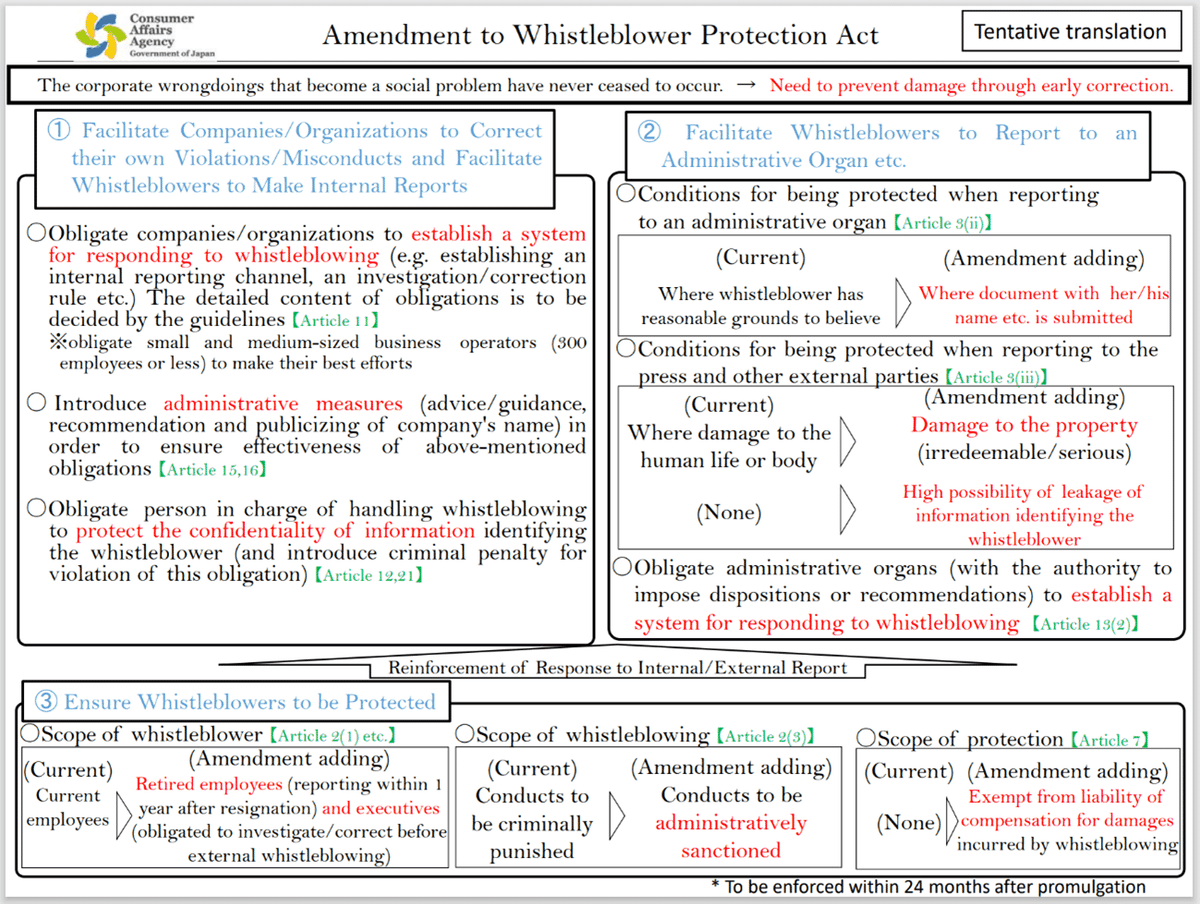
[Alert] The Amended Whistleblower Protection Act comes into effect on June 1, 2022
1. Introduction
The amended Whistleblower Protection Act (hereinafter the “Act”) was promulgated on June 12, 2020, and is scheduled to come into effect on June 1, 2022. As the effective date is fast approaching, are you ready for this?
The overall picture of the amendment to the Act is shown in the figure below.

The Act includes several important amendments which have an impact not only on Japanese companies and organizations but also Japanese subsidiaries of foreign companies.
In this article, I introduce the main points which Japanese subsidiaries of foreign companies need to know at minimum.
2. Main points which Japanese subsidiaries of foreign companies need to know at minimum
(1) Establishment of a system for responding to whistleblowing
First, the Act obligates companies and organizations to establish a system for responding to whistleblowing, including establishing an internal reporting channel and an investigation/correction rule (hereinafter the “whistleblowing system”). The Act requires companies and organizations with 300 employees or less to make their best efforts.
The Consumer Affairs Agency published the guideline, based on Article 11 (1) and (2) of the Act (hereinafter the “Guideline”), and the commentary of the Guideline (hereinafter the “Commentary”). Unfortunately, at the present time, the Consumer Affairs Agency has not published the English translation of the Guideline or the Commentary.
The Guideline requires companies and organizations to install various measures such as (i) a cross-departmental whistleblowing system, (ii) a system for protecting whistleblowers, and (iii) some measures which make the whistleblowing system work effectively.
If a company does not comply with the Act or the Guideline, there is a possibility that the Secretary General of the Consumer Affairs Agency will take administrative measures (advice/guidance, recommendation and publicizing of company's name) against the company.
(2) Stipulation of internal regulation
Second, the Guideline requires companies and organizations to stipulate the internal regulation about their whistleblowing system and operate the whistleblowing system in accordance with the provisions of the regulation. Even though a company has its internal regulation about its whistleblowing system, it should check whether the regulation contains necessary and sufficient provisions to comply with all requirements of the Act and the Guideline.
Even though a foreign company may have established a global/group whistleblowing system, Japanese subsidiaries of the foreign company must stipulate their own internal regulations according to the Act, the Guideline, and the Commentary. For more details, please refer to footnote 13 on page 8 of the Commentary.
(3) Designation of a person in charge of handling whistleblowing
Third, Article 11 (1) of the Act obligated companies to designate “persons in charge of handling whistleblowing”. Also, The Guideline requires companies to notify such persons that they are appointed as persons in charge of handling whistleblowing by written notice, etc.
Article 12 of the Act imposes a confidentiality obligation on persons in charge of handling whistleblowing regarding information identifying the whistleblower. If such persons violate the obligation, they may be punished by a fine not exceeding JPY 300,000 (Article 21 of the Act).
(4) Dissemination and Education
Finally, the Guideline requires companies to make the Act and their whistleblowing systems known to their executives, employees, and retired employees (within 1 year after resignation) and educate them.
Also, the Guideline requires companies to sufficiently educate the persons in charge of handling whistleblowing about the protection of confidentiality of information identifying the whistleblower. As I explained above, if such persons violate the confidentiality obligation, they may be punished by a fine. Therefore, a company should educate persons in charge of handling whistleblowing on the importance of their role and of confidentiality.
For more details, please refer to page 18-19 of the Commentary.
It is important for all companies to establish effective whistleblowing systems to prevent serious malfeasance or corporate scandals. The amendment of the Act is a good opportunity to revise internal control and governance including whistleblowing systems. I hope this article will be of some help.
For more information or questions, please feel free to contact us.
Author
Yuhei Sakao, Partner
Yuhei Sakao joined Miura and Partners (M&P) in January 2021 and specializes in crisis management/compliance, corporate governance, ESG/SDGs, and insolvency/restructuring.
Before joining M&P, he worked in leading law firms in Japan and Washington D.C. and dealt with various internal investigations. Also, he was seconded to the Legal Department of Mitsui & Co from 2020 to 2021.
He has been admitted to practice as an attorney-at-law in Japan and New York and is a Certified Fraud Examiner (CFE), a Certified Compliance Officer, a Corporate Crisis Manager, and a Food Labeling Adviser.
この記事が気に入ったらサポートをしてみませんか?
